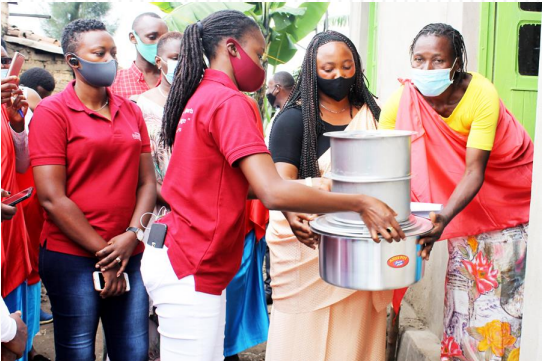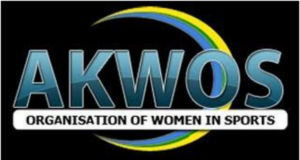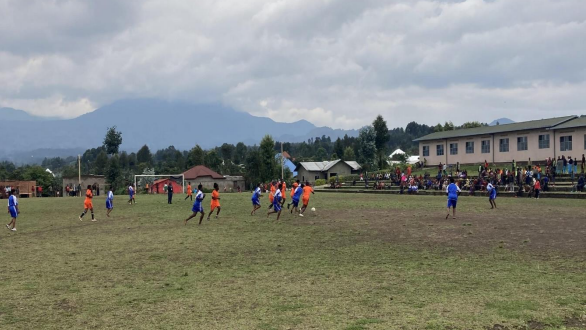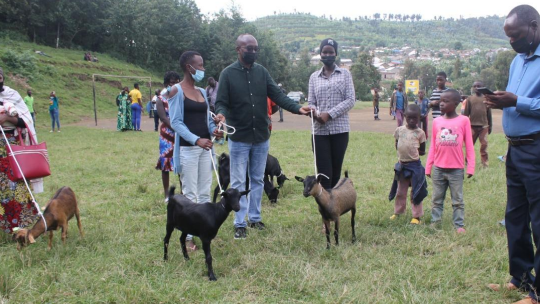
Country
Rwanda
Organisation
AKWOS

Key Words
Leadership, Gender Equality, Empowerment, Sports for change, Community transformation, Women engagement.
Themes
-
- Sexual and Reproductive Health and Rights (SRHR)
- Empowerment of Women and Girls in and through PEPAS
- Gender-Based Violence (GBV) and/or Violence against Women and Girls (VAWG)
- Mental and Physical Health and Wellbeing
Author
Felicite Rwemarika from Rwanda, Founder & Executive Director of AKWOS.
Summary/Overview
The Association of Women in Sports (AKWOS) is a Rwandan non-profit uses sports as a powerful tool to empower and educate women and girls, challenge gender norms, and promote peace and social change. Founded in the aftermath of the 1994 Genocide against the Tutsi by Mrs. Felicite RWEMARIKA in 1998 and regally registered on 20th April 2009 by Rwanda Governance Board (RGB) which governs NGO in the country. AKWOS recognized the unifying and healing potential of sports in rebuilding communities and restoring confidence among women and youth. Through football in rural and urban area, volleyball, and other physical activities, AKWOS creates safe spaces for dialogue, leadership development, and psychosocial healing for teen mothers’ gender-based violence victims.
AKWOS works with grassroots communities from 7 districts of the country to address issues such as family conflicts resolution, peace and security, prevention of gender-based violence, climate change and environmental protection by doing plastic bottle recycling and waste management, school dropouts, as well as limited access of female to economic opportunities. AKWOS has grown into a national and regional voice advocating for gender equality and peacebuilding in and through sports, inspiring thousands of girls and women to become confident, active agents of change in their families and societies. Its impact continues to reshape mindsets and promote inclusive development across Rwanda and beyond
Problem Statement
AKWOS operates in Rwanda, a country in East Africa that has made remarkable strides in gender equality and recovery after the 1994 Genocide against the Tutsi. Rwanda is globally recognized for its high representation of women in leadership, yet many girls and women at the grassroots level continue to face significant challenges. These include gender-based violence (GBV), early pregnancies prevention, school dropouts, limited access to economic opportunities, and deeply rooted cultural norms that hinder their full participation in society. In rural areas, girls often face the added burden of unpaid care work, limited access to sexual and reproductive health education, and inadequate support systems for the referral pathway on their psychosocial well-being. While the government has supportive gender policies, implementation gaps persist, especially in marginalized communities. Sports and physical activity are still often viewed as male dominated spaces, making it harder for girls to participate and benefit from the empowering potential of sports. Within this context, AKWOS uses sports as an entry point to break stigma, build confidence, and promote gender equality. AKWOS creates safe and inclusive spaces where girls and women can build leadership skills, find their voices, and engage in community decision-making as well as ultimately working to transform societal attitudes and improve gender outcomes in Rwandan community.
About the Programme
The program “Strengthening the Role of Young Women in Preventing Conflicts and Peacebuilding at Community Level through Sports” is a community-centered initiative implemented by the Organization of Women in Sports (AKWOS). The program leverages the transformative power of sports, psychosocial support, peacebuilding, and advocacy to empower young women and girls in Rwanda to become active agents of peace and gender equality. It engages young women aged 15 to 30, community leaders, parents, youth coaches, and men as allies to foster inclusive and peaceful communities.
The program uses sports as a safe and inclusive platform to engage youth, promote dialogue, build leadership skills, and create awareness on gender equality and peacebuilding. Through community matches, dialogues, and mentorship, AKWOS facilitates trust-building and conflict resolution across diverse groups. The program also provides capacity-building sessions on GBV prevention, emotional resilience, and human rights, as well as psychosocial support through sports art therapy activities.
In the Rwandan context where historical trauma, gender inequality, and youth unemployment are ongoing challenges the program is implemented in both rural and peri-urban areas where young women face limited opportunities and are often excluded from decision-making spaces. AKWOS works closely with local authorities, grassroots structures, and youth networks to ensure community ownership and sustainability.
The program directly addresses gender-based violence (GBV) by raising awareness, educating communities on harmful gender norms, and empowering girls to report abuse and seek help. It also trains young women in leadership and communication to advocate for their rights and engage in local peacebuilding processes.
To overcome challenges such as gender stereotypes, lack of confidence among girls, and restricted mobility, the program uses role models, community sensitization campaigns, and safe spaces where girls feel supported to express themselves freely. AKWOS also involves boys and men in the process to promote positive masculinity and shared responsibility in preventing violence.
Through this initiative, AKWOS has contributed to increased participation of young women in leadership, reduced stigma around girls in sports, and strengthened community collaboration on gender and peace issues. The program has proven that when empowered through sport and psychosocial support, young women are powerful agents of social cohesion, resilience, and gender equality in Rwanda.
Outcomes
The AKWOS program has significantly advanced gender equality by empowering over 3,500 women and girls through sports-based activities, leadership training, and community dialogue sessions. Through regular participation in football and mixed-gender tournaments, girls gained confidence, challenged gender norms, and increased their visibility in public spaces. Post- activity surveys showed that 78% of participants reported improved self-esteem, while 65% of community members expressed a positive shift in attitudes toward women’s leadership and participation in decision-making. The program also facilitated community dialogues that engaged men and boys as allies, fostering mutual respect and shared responsibility. School reintegration efforts saw a 40% return rate of girls who had previously dropped out, indicating a shift in household priorities and support for girls’ education. Overall, the program effectively used sports as a transformative tool for behaviour change and social inclusion, making a measurable impact on gender equality in the communities served.
Challenges
One major challenge was resistance from conservative community members who viewed sports and leadership as male domains. To address this, AKWOS used community dialogues, engaged local leaders and role models like female coaches and referees available in our country, and emphasized the cultural and social value of women’s participation.
Financial constraints also limited the reach of some activities. We responded by building partnerships with local schools and youth groups to sustain engagement with fewer resources. Persistent challenges include deep-rooted gender stereotypes and limited access to sports facilities for girls. AKWOS continues to advocate for inclusive policies and infrastructure development, while using sports as an ongoing tool to challenge harmful norms and build inclusive communities.
Insufficient funds and lack of other organizations which use sports for social change were an issue. Finally, the COVID-19 pandemic was one of the major challenges faced.
Successes
The AKWOS program successfully empowered women and girls through sports, leadership training, and community engagement. A key success was the transformation in community attitudes: over 70% of participants reported increased support for women’s roles in leadership and peacebuilding.
Mixed-gender sports events created safe spaces for dialogue and inclusion, and many girls who had previously dropped out of school were reintegrated. The program trained 150 community leaders and peer educators, who now champion gender equality locally. Additionally, several young women have taken up leadership positions in local committees, showing increased confidence and agency.
Lessons & Reccomandations
1. Integrating sports with dialogue creates safe entry points for gender discussions. Using sports as a unifying activity made it easier for AKWOS to engage communities in sensitive conversations around gender norms. AKWOS is using culturally accepted sports to spark inclusive dialogue and participation, especially in rural or conservative settings.
2. Involving men and boys is crucial for lasting impact. Most of our programs and project intentionally include men and boys as allies and sometimes ambassadors of change to foster greater acceptance and reduce resistance. Organizing mixed-gender events and training male champions helped shift community mindsets more effectively.
3. Community ownership ensures sustainability. Training local leaders, coaches, and peer mentors created a ripple effect. When communities drive the change, this helps AKWOS programs to continue beyond donor funding. And AKWOS is strengthening this approach by building strong local structures early in the project cycle.
4. Linking sports to education and leadership boosts long-term impact. Within our small studies conducted from different districts of the country, AKWOS noticed that sports alone is not enough; combining it with life skills, leadership training, and school reintegration support enhances girls and women’s confidence and future prospects.
5. Flexibility is key to overcoming barriers. Being adaptable such as shifting locations or timing to accommodate women and girls’ chores and school schedules ensures higher participation and retention. That why all our programs designed with feedback loops to remain responsive to community needs.
Additional Resources
AKWOS official x (twitter) account: @akwosrwanda
AKWOS official Facebook account: https://www.facebook.com/AkwosRwanda/?locale=fr_FR
AKWOS YouTube Channel (Program Videos & Testimonials): https://www.youtube.com/@akwosrwanda
AKWOS Annual Reports and Success Stories: https://akwos.org/reports
UN Women & IOC “One Win Leads to Another” Initiative: https://olympics.com/ioc/news/one-win-
References
Powerpoint Presentation (Version of 21 May 2024) Presentation AKWOS _AIMF
AKWOS Official Website – https://www.akwos.org
Kvinna till Kvinna – Gender and Peacebuilding Programs – https://kvinnatillkvinna.org
UN Women – Sport for Generation Equality:
https://www.unwomen.org/en/news/stories/2020/3/feature-sport-for-generation-equality
UNESCO – Sport and Gender Equality Toolkit: https://unesdoc.unesco.org/ark:/48223/pf0000247642
Women Win- Empowering Girls through Sport: https://www.womenwin.org/
UNFPA Rwanda – Youth Engagement through Sports: https://rwanda.unfpa.org/en/news/youth-
Girls Not Brides – Engaging Boys and Men: https://www.girlsnotbrides.org/learning-
African Union Sports Policy Framework – https://au.int/en/documents/20190122/sports-policy-
The Power of Sport to End Gender-Based Violence – Global Goals: https://www.globalgoals.org/news/sport-against-gbv/
Sport for Development and Peace – International Working Group: https://www.sportanddev.org



